Wayne Kramer, according Rolling Stone, is one of the top 100 guitarists in the world. Heck, Activision featured him in their Guitar Hero: World Tour video game. Starting in 1967 with the politically active MC5—aside from being Detroit’s most ripping proto-punk band, they were co-founders of the White Panthers—Kramer has been longstanding intermediate on the divide between music and politics, driving his involvement in the U.S. branch of Jail Guitar Doors, Billy Bragg’s initiative to provide new guitars to prisoners willing to find rehabilitation in music.
After MC5 disbanded, Kramer went into a tailspin, culminating in a three-year stint in a Kentucky "Narcotic Farm" prison (1976-78). There, he met Red Rodney, a member of the Charlie Parker Quintet, who took him under his wing, and Kramer found that music helped him rehabilitate into the world. Nowadays, Kramer is a career musician with 11 solo albums, scores to several films, television programs, and theme songs to his credit, but much of his time is devoted to Jail Guitar Doors.
Recently, Kramer made two trips to the California State Prison in Lancaster. One trip was to support Honor Yard, a program that inmates have organized themselves, eschewing gangs and drug use in exchange for the ability to study and play music, despite the prison's shoddy equipment. Then, at the beginning of July, Kramer went with a cadre of musicians to perform for the prisoners, a project that was a few years in the making due to budget restraints—the prison couldn’t afford overtime for guards. GOOD chatted with Kramer about the state of the penal system, and what we can do to change it.
GOOD: Did you get blisters on your fingers from that solo for ‘Kick Out the Jams’?
WAYNE KRAMER: Not on the left hand, but on the right hand.
GOOD: You spent time at the Federal Correctional Institution at Lexington for dealing cocaine. You’ve said, “I wasn’t in prison when I was playing,” because you were in the clouds of bars and chord changes and melodies and rhythms. Do you still get transported when you’re playing?
KRAMER: I do. Playing music is one of the most CPU-intensive activities that humans do, way more than language or any physical activity, because music is so complex. First, you have to be conscious of what you’re playing, and what you’re going to be playing in a few seconds, and the timbre of your instrument, the chord progression, the melody, the harmony. You have to consider the other musicians. What are they playing? Your brain is processing how you’re interacting with them. And if you’re singing, you have to deal with the lyric, the timbre of your voice, the melody. There is nothing else in human experience that uses up that much brainpower.
GOOD: I agree that it’s really complex—I tried to play guitar when I was a kid and failed miserably. You had access to guitars when you were in prison. Did you find that there was less access in today’s prison system?
KRAMER: Without a doubt, but with some exceptions. In general, for the last 30 years, the focus in American corrections has been on punitive incapacitation, not on rehabilitation. When I arrived at the FCI at Lexington, the focus was on rehabilitation. The staff encouraged you to get involved in all the programs that they made available, things like RBT (Rational Behavior Training), or PMA (Positive Mental Attitude), or Transactional Analysis (they were featuring Dr. Berne’s ‘I’m OK, You’re OK’ as a therapeutic mode for insight into our anti-social behavior), encounter groups, group therapy, and college courses. I saw the programs go away during my almost three years at this facility. When I left, the place was filled with bunk beds in the hallways because of the escalating ‘war on drugs.’
If we don’t try to help someone to improve themselves while we have them, then we’re jeopardizing our own safety. If your car breaks down, you don’t beat your car; you fix your car. Maybe we could try that with human beings? The trouble is, they’ve spent all the money on building more/bigger/secure prisons, that they can’t afford rehabilitative programs. California’s prisons were at one point 200 percent over capacity. The courts have ordered them to lower it down to 110 percent, but they haven’t met that standard yet.
GOOD: You presumably see the prison system as completely messed up beyond repair.
KRAMER: People who deal with prisoners day in and day out understand that these are human beings, and that 95 percent of them will be released one day. There’s an institutional status quo that has to be fought against. There’s a component in the American psyche that is looking for revenge and retribution. It’s ugly. I’m not saying people shouldn’t be held accountable. I believe in the rule of law, but I don’t disagree with my brothers and sisters of Critical Resistance [an international movement that opposes prisons] that there probably is a better idea than prison.
GOOD: The penal system has fallen off the political radar. Why is it something you’ve glommed to?
KRAMER: Right now, there’s about 12 million ex-offenders alive in America, most of whom are disenfranchised, who cannot participate in the political process, who are barred from many jobs and licenses. It’s hard enough finding a job in the first place, let alone after being branded a convicted felon—who has paid his or her price—and continues to be segregated outside the mainstream.
GOOD: Music is one of the only fields that doesn’t discriminate against ex-convicts. You can really make your own way, and possibly even market yourself as the rehabilitated ex-convict.
KRAMER: I don’t disagree with you. But of all the careers that I would recommend to someone, there are many things that have fewer stumbling blocks than professional musician. Generally, most professional musicians do something else to supplement their income, because there are so many really accomplished musicians and so few jobs available. The idea of becoming rich and famous, I put the odds, realistically as 100,000 to one. Just about the same as your chances of becoming a wealthy professional athlete.
GOOD: What’s the best song you’ve heard come from a prisoner?
KRAMER: At the Northern Nevada Correctional Complex, they’ve got a program there for geriatric prisoners called ‘True Grit.’ True Grit has about nine bands on their yard, and one of the bands is a country band, and this fellow got up there and he sang this song he wrote called ‘Bottles and Cans’ about being a homeless guy, and how his life was reduced to collecting bottles and cans.
GOOD: How can musicians get involved with Jail Guitar Doors?
KRAMER: A local band that wanted to be of service could organize a benefit at a club in their district, get their friends in bands to all come and play, raise some money, buy their own guitars, and take them into their own local prisons where their friends and family are serving time. We can help with how to deal with authorities, how to buy the guitars, and we can give them key art.
GOOD: I’m sure some of the newer guitar players get blisters on their fingers. How do you tell them to get through it?
KRAMER: They actually go away after awhile. The nerve ends in your fingers adapt finally.








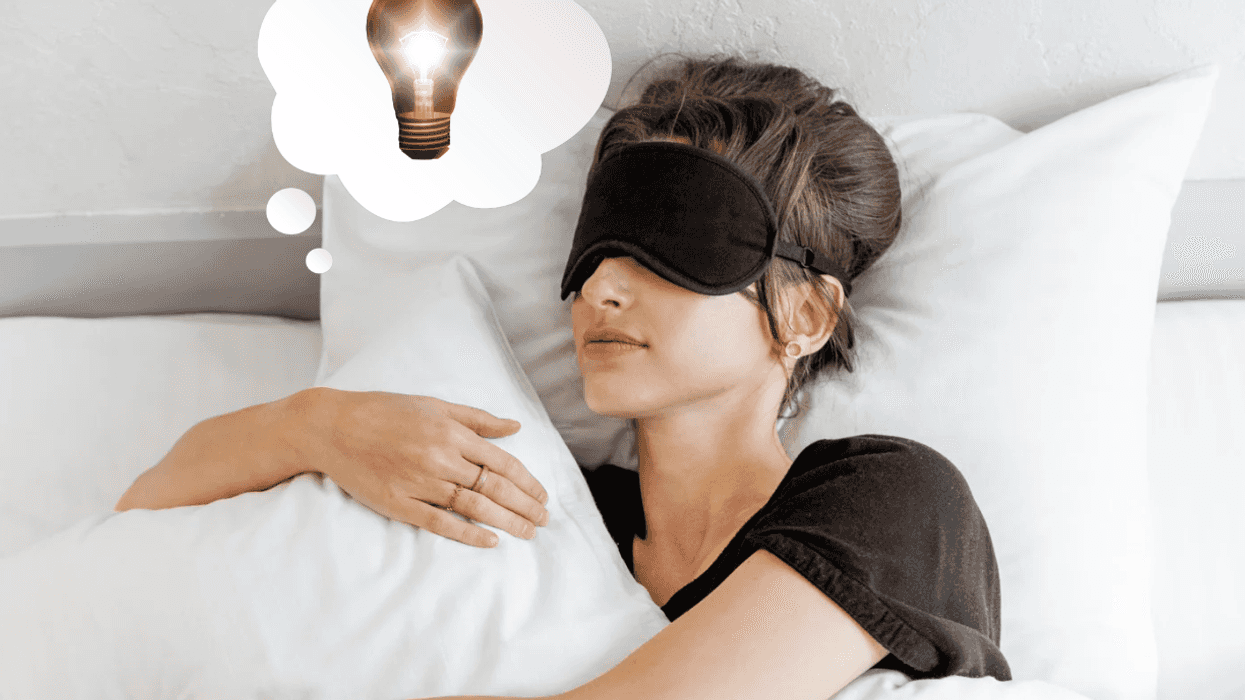







 A coupe on a romantic dateCanva
A coupe on a romantic dateCanva
 A woman swims in the oceanCanva
A woman swims in the oceanCanva A happy-looking dolphin popping out of the waterCanva
A happy-looking dolphin popping out of the waterCanva
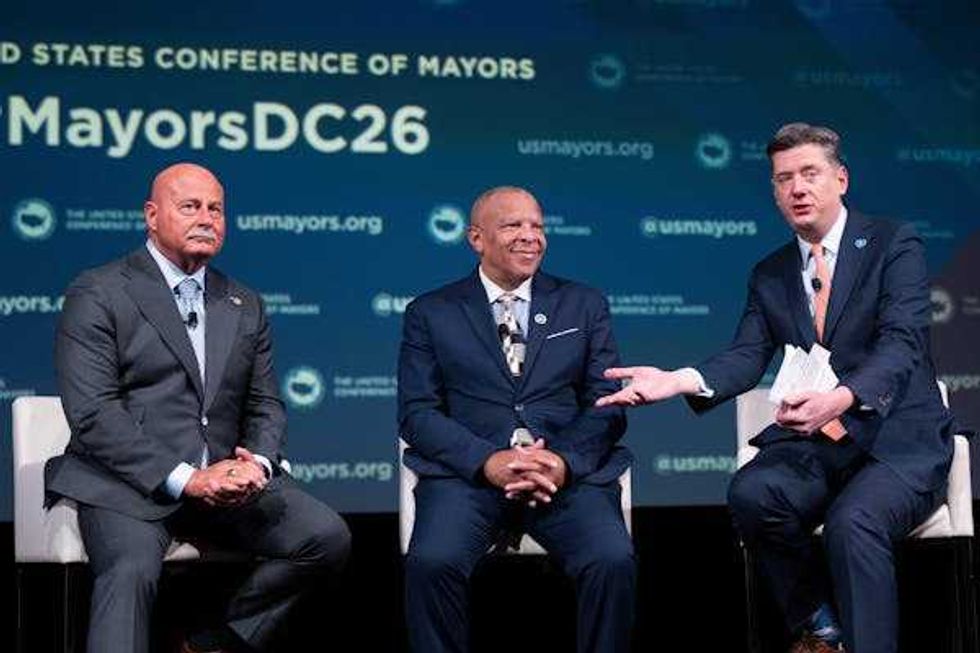 When mayors come together, they often find they face common problems in their cities. Gathered here, from left, are Jerry Dyer of Fresno, Calif., John Ewing Jr. of Omaha, Neb., and David Holt of Oklahoma City.
When mayors come together, they often find they face common problems in their cities. Gathered here, from left, are Jerry Dyer of Fresno, Calif., John Ewing Jr. of Omaha, Neb., and David Holt of Oklahoma City.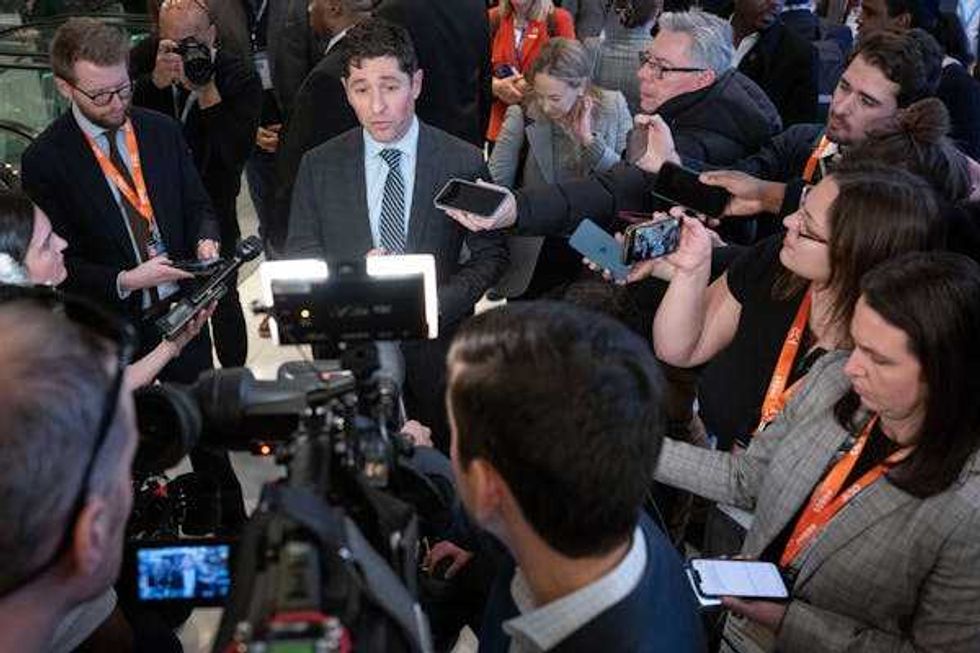 Mayors can find themselves caught up in national debates, as did Minneapolis Mayor Jacob Frey over the Trump administration’s immigration enforcement policies in his city.
Mayors can find themselves caught up in national debates, as did Minneapolis Mayor Jacob Frey over the Trump administration’s immigration enforcement policies in his city.

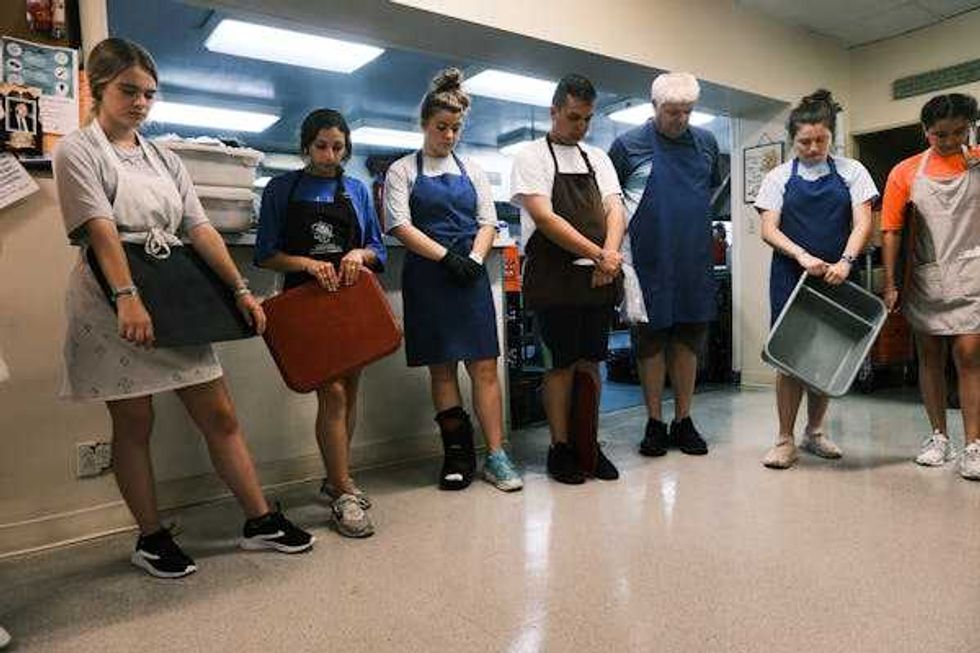 Volunteers at the St. Francis Inn pray together before serving a meal on July 19, 2021.
Volunteers at the St. Francis Inn pray together before serving a meal on July 19, 2021.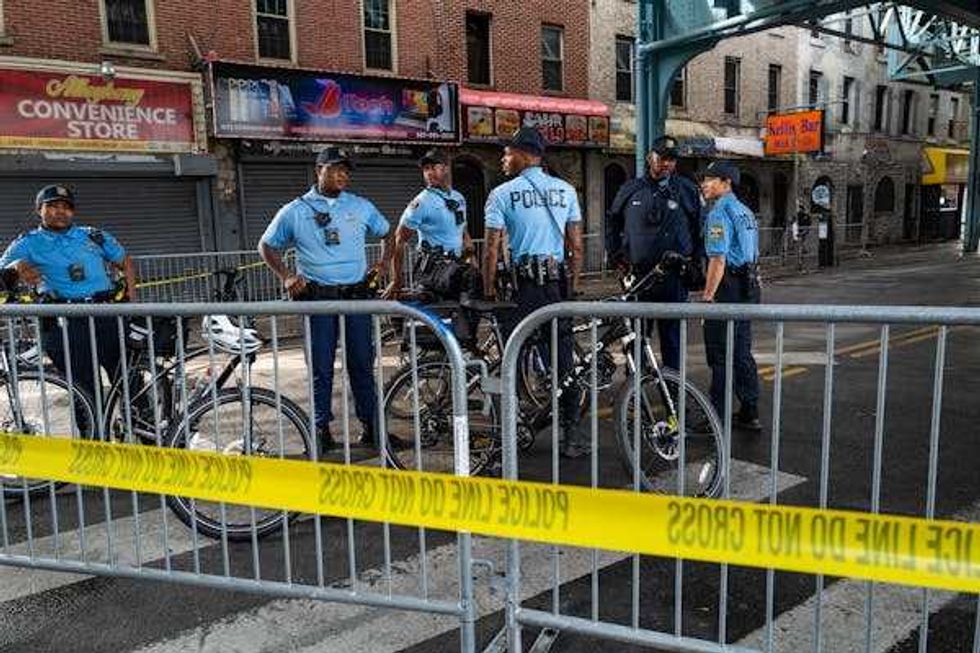 Police close down a section of Kensington Avenue to clear a homeless encampment on May 8, 2024.
Police close down a section of Kensington Avenue to clear a homeless encampment on May 8, 2024.

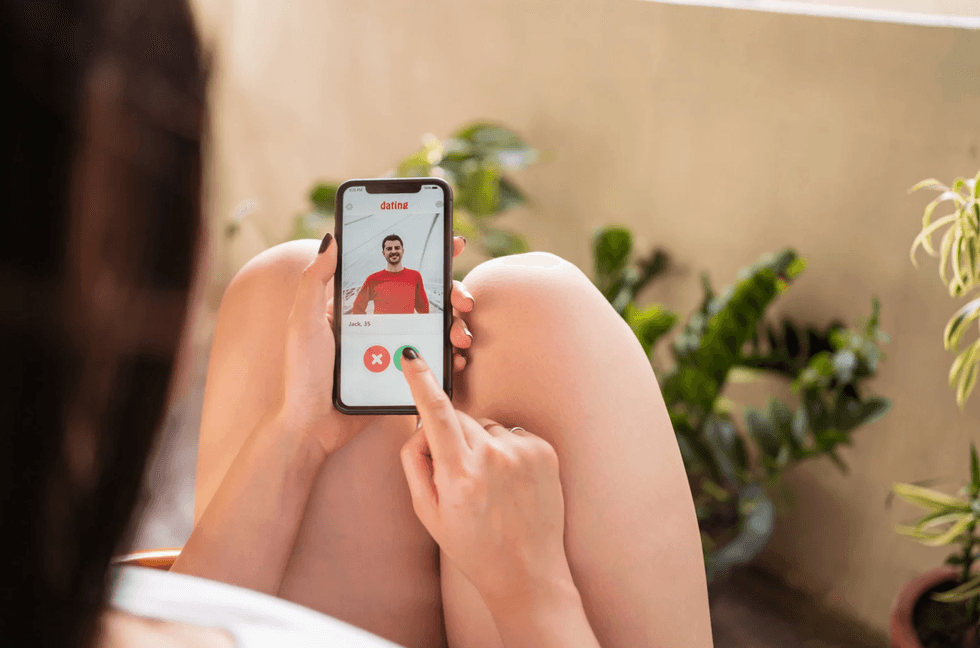 A woman scrolls through a dating appCanva
A woman scrolls through a dating appCanva
 Openly choosing the one you like best can help break down stigmas.
Openly choosing the one you like best can help break down stigmas.